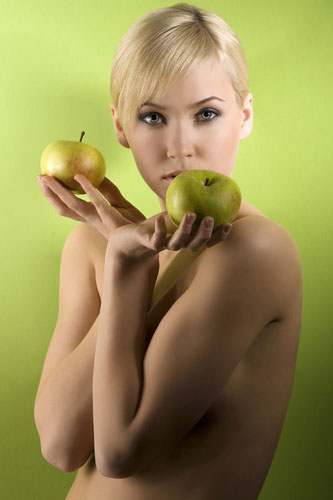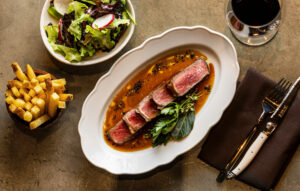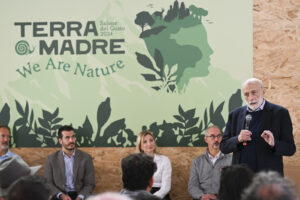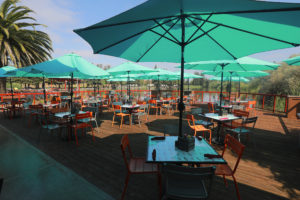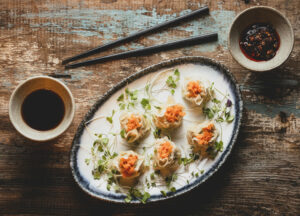 Eating has never seemed so complicated, especially when it comes to our health. Food wrappers and labels shout their supposed benefits: Low-fat, no trans-fats, anti-oxidant, heart-healthy. But in the end, as a nation we’re fatter than ever and continuing to suffer in record numbers from diabetes, cardiovascular disease and cancer. So what’s the answer?
Eating has never seemed so complicated, especially when it comes to our health. Food wrappers and labels shout their supposed benefits: Low-fat, no trans-fats, anti-oxidant, heart-healthy. But in the end, as a nation we’re fatter than ever and continuing to suffer in record numbers from diabetes, cardiovascular disease and cancer. So what’s the answer?
Even among nutritionists, there’s debate, but what almost all agree on for everything from cancer prevention to losing weight: Lowering fat, limiting processed foods and eating more fruits and vegetables. Pretty much the same stuff we’ve been hearing for years and ignoring. Author Michael Pollan, whose books, “the Omnivore’s Dillemma” and “In Defense of Food” have helped to ignite a wider understanding of our current food crisis says simply, “Eat food. Not too much. Mostly plants.”
And when it comes to breast cancer, specifically, there are many theories about obesity, alcohol use, refined sugars and meat consumption. But the truth is that doctors still don’t know with any complete certainty what causes breast cancer. Nor is there any magic food that will cure or prevent cancer.
Strong evidence, however, is emerging that animal products and pesticides may be at least part of the problem.
“As far as the anti-cancer diets go in general-most advocates suggest people avoid pesticides and all animal products. The China Study, though not written by a doctor or nutritionist, has become a Bible for some. The authors advocate for a vegan diet as a way to suppress cancer,” said Nora Bulloch, a registered dietician and nutritionist who teaches at the Northern California Center for Well-Being. “Other anticancer diets encourage the anti-inflammatory diet which eliminates all refined foods, sugar and really anything that is high on the glycemic index. The theory is that high glycemic index foods raise insulin levels quickly and this leads to inflammation-the cause of all disease,” she added.
But for many, a diet without meat, flour, sugar, dairy or eggs is simply too restrictive. So what Bulloch and other nutritionists I spoke to advocate is boosting up “good foods” and cutting back on “culprit” foods that may have negative effects. Here are a few of their recommendations…
– Mushrooms: Medicinal mushrooms (such as shiitake, maitake, oyster and even white button or crimini or portabella) are high on the list of healthy helper foods for registered dietician and teacher Jill Nussinow, aka The Veggie Queen. Mushrooms are rich in selenium, an antioxidant. Nussinow also is a fan of fermented foods (pickles, sauerkraut) and home grown sprouts, especially in the cruciferous vegetable family.
– Seaweed: Nurse Practioner Elaine Weil of the Amitabha Medical Clinic and Healing Center in Sebastopol suggests incorporating small amounts of seaweed (sea vegetables into your diet) which contain trace minerals including iodine which are very important for breast health. “Try sprinkling dulse flakes on your salads and grains, or add vegetarian sushi to your diet,” she suggests.
– Turmeric: There’s increasing evidence that this yellow spice native to the ginger family may have some powerful health benefits. Considered an anti-oxidant and anti-inflamatory, turmeric is an integral ingredient in curry and gives regular mustard it’s bright yellow color.
– Alcohol: When it comes to breast cancer, limiting or eliminating alcohol is suggested, with no more than one small drink per day.
– Soy: Because soy contains estrogen-like isoflavones, there is concern that it may stimulate the estrogen receptors of breast cancer cells to grow, which is why many doctors warn breast cancer patients against eating soy products. The jury’s still out, however, as others point to the positive effects of soy on Asian diets and as a substitute for meat and dairy. Experts say to use in moderation and ask your doctor about avoiding soy supplements if you have breast cancer.
– Flax seed: Another phytoestrogen, flax seeds have long helped with menopausal symptoms. Nutritionists love this mega-seed for its health-giving alpha-linolenic acid (a plant form of Omega-3 fatty acids), but again, its worth talking to your doctor about if you already have breast cancer.
– Nuts and fish: Although fish at the high-end of the food chain can contain high levels of mercury, wild-caught salmon and sardines (which are at the low end of the chain) are top picks for their Omega-3 oil content. Walnuts also have high levels of Omega-3.
– Leafy Greens and Cruciferous Veggies: Kale, cabbage, Bok Choy, broccoli and cauliflower should become your new best friends if you’re worried about your breast health. High in natural cancer-fighting plant chemicals, it’s thought to help inhibit breast cancer cells from growing as quickly. They’re also rich in Vitamin C.
– Green Tea: As with many Asian foods, scientists are finding positive health effects from this powerful antioxidant. Studies show that it inhibits cancer and tumor growth.
– Olive Oil: Food needs fat for taste and cooking, but not all fats are created equal. Olive oil is the choice of nutritionists not only for its monounsaturated fats, but also for its high antioxidant content.
– Berry Good: Ripe berries in every color are good for the body and soul. Dark blue or black fruits (blueberries, blackberries) are thought to have the most antioxidants, but the vitamin C and fiber of all berries make them a top breast-cancer pick. Keep in mind, however, that berries often contain high amounts of pesticide, so opt for locally-grown organics whenever possible for all your fruits and veggies.
Foods for breast health
Booby-friendly foods to celebrate Breast Cancer Awareness Month
